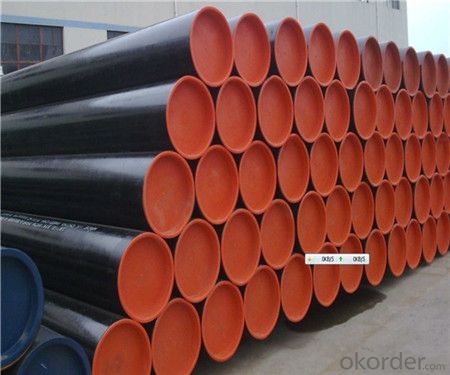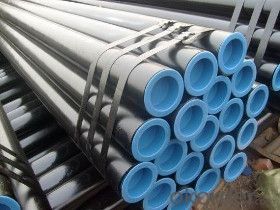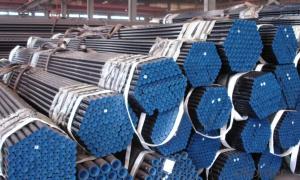Round Seamless Steel Pipes
- Loading Port:
- Tianjin
- Payment Terms:
- TT or LC
- Min Order Qty:
- 100 m.t.
- Supply Capability:
- 1000 m.t./month
OKorder Service Pledge
OKorder Financial Service
You Might Also Like
Product Details:
1. Commodity Name: Seamless steel pipe
2. Standard: API,GB,ASTM,ASME,DIN
3. Quality grade: 10#, 20#, A106B, A53B, API 5L B, Q235, Q345, ST37-2, ST 45, ST52.etc.
4. Dimension:
OD: 1/2"-24"
WT: 2.5-80mm, SCH10~SCH40~XXL
length: 5.8m,6m,8m,9m,12m
5. Technique: Hot Rolled/Cold Rolled/ Cold Drawn
6. Application
Widely used in gas, water and oil, transpotation;constructions;Bridge,highway,windows of model steel door; building materials;fences;heating facilities Fluid Pipe;conduit pipe,scaffolding pipe.etc.
7. Payment Terms: L/C D/A D/P T/T
8.packing and shipment
Packaged in bundles,as per customers' requirements, it can also bepackagesd as beveled ends, typed marking, black painting, plastic caps protection,woven bags packing
For 20" container the max length is 5.8m; For 40" container the max length is 12m. other options are available based on customer requests. Please discuss when placing orders.
9. Surface: painted with varnish;
10. Plastic caps at ends.
11. Tolerance: OD +1%/-1%
WT +12.5%/-10%
Seamless Black Steel Pipes Image


FAQ of Seamless Pipe
①How is the quality of your products?
Our products are manufactured strictly according to national and internaional standard.If products’ quality don’t accord to discription as we give or the promise before you place order, we promise 100% refund.
②How about price?
We are factory and be able to give you lowest price below market one, and we have a policy that “ for saving time and absolutely honest business attitude, we quote as lowest as possible for any customer, and discount can be given according to quantity”.
③Why should you chose us?
Chose happens because of quality, then price, We can give you both.Our service formula: good quality+good price+good service=customer’s trust
SGS test is available, customer inspection before shipping is welcome, third party inspection is no problem.
Any question, pls feel free to contact us !
- Q:Can steel pipes be used for cooling systems?
- Steel pipes are a viable option for cooling systems. They are frequently employed in different scenarios, such as cooling systems, because of their robustness, strength, and ability to withstand high temperatures and pressure. Industrial cooling systems, in particular, benefit from steel pipes due to the harsh environmental conditions and corrosive fluids they often encounter. Moreover, steel pipes possess outstanding heat conductivity, which facilitates efficient heat transfer, rendering them a dependable choice for cooling purposes. Furthermore, steel pipes can be easily tailored, joined, and adjusted to fulfill specific cooling system needs. Nevertheless, it is crucial to ensure that the steel pipes utilized are adequately coated or insulated to prevent corrosion and minimize heat dissipation.
- Q:What is the difference between black steel pipe and galvanized steel pipe?
- The main difference between black steel pipe and galvanized steel pipe lies in their coating. Black steel pipe is untreated and has a dark, matte appearance, while galvanized steel pipe is coated with a layer of zinc to prevent rusting and has a silver, shiny appearance. This coating makes galvanized steel pipes more durable and suitable for outdoor use, while black steel pipes are commonly used for indoor plumbing and gas lines.
- Q:What are the different grades of steel used for pipes?
- There are several different grades of steel used for pipes, each with their own specific properties and applications. Some of the most commonly used grades include: 1. Carbon Steel: This is the most common type of steel used for pipes and is typically used in low-pressure applications. It has a low carbon content, usually less than 0.30%, which makes it easy to weld and form. Carbon steel pipes are durable and cost-effective, making them suitable for a wide range of industries. 2. Stainless Steel: Stainless steel pipes are known for their corrosion resistance and high strength. They are made from an alloy of iron and chromium, with additional elements like nickel and molybdenum to enhance their properties. Stainless steel pipes are commonly used in industries such as chemical, food processing, and oil and gas, where corrosion resistance is crucial. 3. Alloy Steel: Alloy steel pipes are made by adding elements such as manganese, chromium, or nickel to carbon steel. This enhances their strength, hardness, and resistance to wear, making them suitable for high-pressure and high-temperature applications. Alloy steel pipes are commonly used in industries such as power generation, petrochemical, and aerospace. 4. Duplex Steel: Duplex steel is a type of stainless steel that contains a combination of austenite and ferrite phases. This results in a material with excellent strength, corrosion resistance, and toughness. Duplex steel pipes are commonly used in offshore oil and gas platforms, as well as in chemical and petrochemical industries. 5. Low-Temperature Steel: Low-temperature steel is designed to withstand extremely cold temperatures without becoming brittle. These pipes are typically used in industries such as cryogenic storage, LNG (liquefied natural gas) transportation, and refrigeration. It is important to select the appropriate grade of steel for a specific application to ensure the pipe's performance and longevity. Factors such as temperature, pressure, corrosion resistance, and cost should be considered when choosing the grade of steel for pipes.
- Q:What are the different types of steel pipe nipples?
- There are several different types of steel pipe nipples that are commonly used in various applications. These types include seamless, welded, threaded, and grooved steel pipe nipples. 1. Seamless steel pipe nipples: Seamless nipples are manufactured from a solid piece of steel without any seams or joints. This type of nipple is often preferred for high-pressure or critical applications due to its superior strength and reliability. Seamless nipples can be threaded or plain-ended, depending on the specific requirements. 2. Welded steel pipe nipples: Welded nipples are made by joining two or more pieces of steel together through welding. This type of nipple is commonly used in non-critical applications where high pressure is not a concern. Welded nipples are available in both threaded and plain-ended options. 3. Threaded steel pipe nipples: Threaded nipples have external threads at one or both ends, allowing them to be easily connected to other threaded fittings or pipes. These nipples are commonly used in plumbing, water supply systems, and other applications where a secure and leak-free connection is essential. Threaded nipples are available in various lengths and diameters to accommodate different requirements. 4. Grooved steel pipe nipples: Grooved nipples have a groove or indentation around the circumference of the nipple, which allows for easy installation using grooved couplings. This type of nipple is commonly used in fire protection systems, HVAC systems, and other applications where quick and efficient installation is necessary. Grooved nipples are available in various sizes and configurations to suit different piping systems. In summary, the different types of steel pipe nipples include seamless, welded, threaded, and grooved nipples. Each type has its own advantages and is suitable for specific applications. It is important to consider the specific requirements and conditions of the project before selecting the appropriate type of steel pipe nipple.
- Q:What is the difference between hot dip galvanized steel pipe and galvanized steel pipe?
- 1, the process is different, one is chemical treatment, one is physical treatment; hot-dip galvanized coating is reliable, not easy to fall off2, hot-dip galvanized coating thickness, so strong corrosion resistance. And zinc plating (electroplating) coating evenly, surface quality is better, coating thickness is generally between a few microns to more than ten microns.3 hot galvanizing is a chemical process, which belongs to electrochemical reaction. Zinc plating is a physical treatment, just brush a layer of zinc on the surface, there is no galvanizing inside, so the zinc layer is easy to fall off. Hot-dip galvanizing is used in building construction.4 、 hot galvanized pipe is to make molten metal and iron matrix reaction and produce alloy layer, so that the substrate and coating two combination.
- Q:How are steel pipes used in the manufacturing of food processing equipment?
- Steel pipes are commonly used in the manufacturing of food processing equipment due to their durability, strength, and resistance to corrosion. These pipes are used to transport various food products such as liquids, powders, and gases within the equipment. They are also utilized in the construction of frames, supports, and structures for food processing machinery, ensuring stability and longevity. Additionally, steel pipes are often employed in the creation of heat exchangers, which are crucial for heating or cooling purposes in food processing equipment.
- Q:How are steel pipes used in the manufacturing of desalination plants?
- Steel pipes are used in the manufacturing of desalination plants to transport the seawater from the intake point to the treatment facilities. These pipes are durable, corrosion-resistant, and can withstand the high-pressure conditions required for the desalination process.
- Q:Can stainless steel pipes spray black paint?
- Can. The surface roughening with a thick gauze, do not use ordinary paint intensity difference. With resin paint, paint can be
- Q:Can steel pipes be used for conveying food and beverages?
- No, steel pipes are not suitable for conveying food and beverages as they can corrode and contaminate the products.
- Q:Are steel pipes suitable for high-temperature applications?
- Yes, steel pipes are suitable for high-temperature applications. Steel has excellent heat resistance properties and can withstand high temperatures without deformation or structural failure. Additionally, steel pipes can be specifically designed and coated to enhance their heat resistance, making them ideal for various industrial processes and applications involving high temperatures.
1. Manufacturer Overview |
|
|---|---|
| Location | |
| Year Established | |
| Annual Output Value | |
| Main Markets | |
| Company Certifications | |
2. Manufacturer Certificates |
|
|---|---|
| a) Certification Name | |
| Range | |
| Reference | |
| Validity Period | |
3. Manufacturer Capability |
|
|---|---|
| a)Trade Capacity | |
| Nearest Port | |
| Export Percentage | |
| No.of Employees in Trade Department | |
| Language Spoken: | |
| b)Factory Information | |
| Factory Size: | |
| No. of Production Lines | |
| Contract Manufacturing | |
| Product Price Range | |
Send your message to us
Round Seamless Steel Pipes
- Loading Port:
- Tianjin
- Payment Terms:
- TT or LC
- Min Order Qty:
- 100 m.t.
- Supply Capability:
- 1000 m.t./month
OKorder Service Pledge
OKorder Financial Service
Similar products
New products
Hot products
Related keywords































